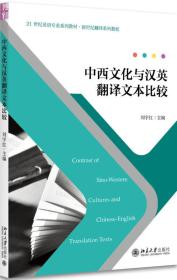
中西文化与汉英翻译文本比较
¥ 11.43 3.3折 ¥ 35 九品
仅1件
北京昌平
认证卖家担保交易快速发货售后保障
作者刘宇红 著
出版社北京大学出版社
出版时间2017-09
版次1
装帧平装
货号A3
上书时间2024-12-21
- 在售商品 暂无
- 平均发货时间 15小时
- 好评率 暂无
- 最新上架
商品详情
- 品相描述:九品
图书标准信息
- 作者 刘宇红 著
- 出版社 北京大学出版社
- 出版时间 2017-09
- 版次 1
- ISBN 9787301287040
- 定价 35.00元
- 装帧 平装
- 开本 16开
- 纸张 胶版纸
- 页数 180页
- 字数 310千字
- 丛书 21世纪英语专业系列教材·新世纪翻译系列教程
- 【内容简介】
-
《中西文化与汉英翻译文本比较》是南京师范大学"英汉翻译文本类型对比案例库"项目的最终成果,部分内容用作南京师范大学的MTI"英汉语比较导论"课程教材,已经试用多年,收到良好效果。
全书分十八章,分别涵盖政治制度、法律、文学、典籍、影视、新闻传播、传统文化、社会流行语、体育、科技、医药、气象、旅游、贸易、动植物、餐饮等16个领域,每一领域成为一章。在内容安排上,每章包括五节,每一节是题解,介绍该领域的基础知识或基本概念,第二节是该领域的文化对比,介绍中国和西方社会在该领域的差别。第三节是语言比较,涉及汉语和英语在特定领域的语言使用规律,即相同语义内容的语际表达差异,与翻译技巧直接关联。该节以特定领域的经典例句为载体,对英汉两种语言在所选定领域的语言差异做了较深入的比较,是对第二节文化差异的呼应和具体化。第四节和第五节分别是中西文化与汉英语言对比的译例样板和专业词汇对照表。译例样板的选题取自该领域较有代表性的语篇,体现文化差异的典型性特征和语际差异的应对技巧,在译例样板之后是该领域专门词汇和用语的对照列表。
本书内容全面,知识覆盖面广,涵盖政治、经济、文化、艺术、科技、社会生活、风土人情的各个方面。本书既可以用作翻译读本,也可以用作文化读本,读者面广,适用性大。 - 【作者简介】
- 刘宇红,2003年毕业于复旦大学,获文学博士毕业,同年破格晋升为教授。现任南京师范大学外国语学院教授、博士生导师。2005年分别入选湖南省哲学社会科学研究"百人工程"和"湖南省新世纪121人才工程"。2005年至2006年在美国休斯敦Rice University访学。
- 【目录】
-
Chapter 1 Contrast of Sino-Western Cultures and Chinese-English Translation Texts in the Field of Political System
1.1.What Is Political System
1.2.Cultural Contrast of Political System in China and the West
1.2.1.Political System in China
1.2.2.Political System in the West
1.3. Chinese-English Translation Texts in the Field of Political System
1.3.1. Cross-matching between Linguistic ranks
1.3.2. Shortened form in Chinese Corresponding to Full-Length Form in English
1.4. Sample
1.5.A Glossary of Political System in Chinese and English
Chapter 2 Contrast of Sino-Western Cultures and Chinese-English Translation Texts in the Field of Law
2.1. What Is Law
2.2.Cultural Contrast of Law in China and the West
2.2.1.Law in China
2.2.2.Law in the West
2.3.Chinese-English Translation Texts in the Field of Law
2.3.1. English Favoring the Passive Voice, Chinese the Active
2.3.2. English Favoring Lengthy Sentences, Chinese Short Ones
2.3.3. Nominalized Words in English Corresponding to Verbs in Chinese
2.4. Sample
2.5.A Glossary of Law in English and Chinese
Chapter 3 Contrast of Sino-Western Cultures and Chinese-English Translation Texts in the Field of Literature
3.1. What Is Literature
3.2. Cultural Contrast of Literature in China and the West
3.3.1. Literature in China
3.2.2. Literature in the West
3.3. Chinese-English Translation Texts in the Field of Literature
3.3.1. Multilevel Correspondence in Lexicon, Rhetoric and Sentence Structure
3.3.2. Resorting to Phonetic Transcription in Chinese
3.3.3. Resorting to Paraphrasing in Chinese
3.4. Samples
3.5. A Glossary of Literature in English and Chinese
Chapter 4 Contrast of Sino-Western Cultures and Chinese-English Translation Texts in the Field of Classics
4.1. What Is Classics
4.2. Cultural Contrast of Classics of China and the West
4.2.1. Classics of China
4.2.2. Classics of the West
4.3. Chinese-English Translation Texts in the Field of Classics
4.3.1. Considering the Content in Translating the Titles of Classics
4.3.2. Considering Differences in Thinking Modes
4.3.3. Proper Use of Footnotes in Translation
4.4. Samples
4.5. A Glossary of Chinese Classics in English and Chinese
Chapter 5 Contrast of Sino-Western Cultures and Chinese-English Translation Texts in the Field of Film
5.1. What Is Film
5.2. Cultural Contrast of Film in China and the West
5.2.1. Film in China
5.2.2. Film in the West
5.3. Chinese-English Translation Texts in the Field of Film
5.3.1.Techniques in the Translation of Film Titles
5.3.2. Integrating the Actor’s Lines with the Hero’s State of Mind
5.4. Samples
5.5. A Glossary of Film in English and Chinese
Chapter 6 Contrast of Sino-Western Cultures and Chinese-English Translation Texts in the Field of Journalism
6.1. What Is Journalism
6.2.Cultural Contrast of Journalism in China and the West
6.2.1.Journalism in China
6.2.2.Journalism in the West
6.3.Chinese-English Translation Texts in the Field of Journalism
6.3.1.Neglecting the Connotative Meaning of the Source Language
6.3.2. Readjusting the Word Order of the Source Text
6.3.3. Addition or Deletion
6.4.Samples
6.5. A Glossary of Journalism in English and Chinese
Chapter 7 Contrast of Sino-Western Cultures and Chinese-English Translation Texts in the Field of Folk Culture
7.1. What Is Folk Culture
7.2. Folk Culture in China and the West
7.2.1.Folk Culture in China
7.2.2.Folk Culture in the West
7.3.Chinese-English Translation Texts in the Field of Folk Culture
7.3.1. Cultural Supplementation of Source-Specific Concepts
7.3.2. Retaining the Cultural Connotations of Source Proverbs and Folklores
7.4.Samples
7.5. A Glossary of Folk Culture in English and Chinese
Chapter 8 Contrast of Sino-Western Cultures and Chinese-English Translation Texts in the Field of Catch Phrase
8.1. What Are Catch Phrases
8.2. Cultural Contrast of the Chinese Language and the English Language
8.2.1. The Chinese Language
8.2.2. The English Language
8.3. Chinese-English Translation Texts in the Field of Catch Phrase
8.3.1. Existing Words Obtaining New Meanings
8.3.2. Innovation of New Expressions
8.4. Sample
8.5. A Glossary of Catch Phrases in English and Chinese
Chapter 9 Contrast of Sino-Western Cultures and Chinese-English Translation Texts in the Field of Sport
9.1. What Is Sport
9.2. Cultural Contrast of Sport in China and the West
9.2.1. Sport in China
9.2.2. Sport in the West
9.3. Chinese-English Translation Texts in the Field of Sport
9.3.1. Restoring the Dropped-out Information and Understanding the Initialisms
9.3.2. Paying Special Attention to Technical Terminologies
9.3.3 Translation of Rhetorical Devices and Cultural Images
9.4. Sample
9.5. A Glossary of Sport in English and Chinese
Chapter 10 Contrast of Sino-Western Cultures and Chinese-English Translation Texts in the Field of Science and Technology
10.1. What Are Science and Technology
10.2. Cultural Contrast of Science and Technology in China and the West
10.2.1. Science and Technology in China
10.2.2. Science and Technology in the West
10.3. Chinese-English Translation Texts in the Field of Science and Technology
10.3.1. Nouns or Pronouns, Short Sentences or Lengthy Ones
10.3.2. Front Weight or End Weight
10.4. Samples
10.5. A Glossary of Science and Technology in English and Chinese
Chapter 11 Contrast of Sino-Western Cultures and Chinese-English Translation Texts in the Field of Medicine
11.1. What Is Medicine
11.2. Cultural Contrast of Medicine in China and the West
11.2.1. Medicine in China
11.2.2. Medicine in the West
11.3. Chinese-English Translation Texts in the Field of Medicine
11.3.1. Discriminating Technical Terms from Daily Uses
11.3.2. Explicit or Implicit Use of Modality
11.3.3. English Featuring Hypotaxis, Chinese Parataxis
11.3.4. English Favoring the Passive Voice, Chinese the Active
11.3.5. Techniques in Translating from Chinese into English
11.4. Sample
11.5. A Glossary of Medicine in English and Chinese
Chapter 12 Contrast of Sino-Western Cultures and Chinese-English Translation Texts in the Field of Weather and Climate
12.1. What are Weather and Climate
12.2. Cultural Contrast of Weather and Climate in China and the West
12.2.1. Weather and Climate in China
12.2.2. Weather and Climate in the West
12.3. Chinese-English Translation Texts in the Field of Weather and Climate
12.3.1. Heavy Use of Technical Terms and Abbreviations
12.3.2. Ways of Voice Rendering
12.3.3. Ways of Word Class Conversion
12.3.4. Tackling Lenthy Sentences
12.4. Sample
12.5. A Glossary of Weather and Climate in English and Chinese
Chapter 13 Contrast of Sino-Western Cultures and Chinese-English Translation Texts in the Field of Tourism
13.1. What Is Tourism
13.2.Cultural Contrast of Tourism in China and the West
13.2.1.Tourism in China
13.2.2. Tourism in the West
13.3.Chinese-English Translation Texts in the Field of Tourism
13.3.1. Cultural Transplantation in Scenary Spot Introduction
13.3.2. Deleting Superfluous Information in the Source Language of Chinese
13.3.3. Supplementing Cultural Background Information
13.4.Samples
13.5. A Glossary of Tourism in English and Chinese
Chapter 14 Contrast of Sino-Western Cultures and Chinese-English Translation Texts in the Field of Trade
14.1. What Is Trade
14.2. Cultural Contrast of Trade in China and the West
14.2.1. Trade in China
14.2.2. Trade in the West
14.3. Chinese-English Translation Texts in the Field of Trade
14.3.1. Resorting to Linguistic Deviations
14.3.2. Marking the Differences in Culture
14.3.3. Inclinations for Passive or Active 143
14.4.Samples
14.5. A Glossary of Trade in English and Chinese
Chapter 15 Contrast of Sino-Western Cultures and Chinese-English Translation Texts in the Field of Flora and Fauna
15.1. What Are Flora and Fauna
15.2.Cultural Contrast of Flora and Fauna in China and the West
15.2.1. Flora and Fauna in China
15.2.2.Flora and Fauna in the West
15.3. Chinese-English Translation Texts in the Field of Flora and Fauna
15.3.1. Cultural Implications of Plants
15.3.2. Cultural Implications of Animals
15.4. Samples
15.5. A Glossary of Flora and Fauna in English and Chinese
Chapter 16 Contrast of Sino-Western Cultures and Chinese-English Translation Texts in the Field of Food and Cuisine
16.1. What Are Food and Cuisine
16.2. Cultural Contrast of Food and Cookingin China and the West
16.2.1. Food and Cooking in China
16.2.2.Food and Cooking in the West
16.3. Chinese-English Translation Texts in the Field of Food and Cuisine
16.3.1. Supplementing Cultural Background in the Source Language
16.3.2. Discriminating Semantic Nuances Between Tricky Synonyms
16.4. Samples
16.5. A Glossary of Food and Cuisines in English and Chinese
点击展开
点击收起
— 没有更多了 —

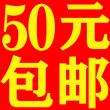

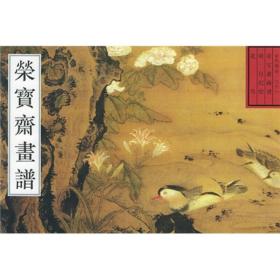


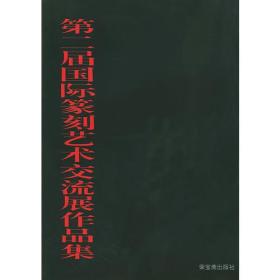
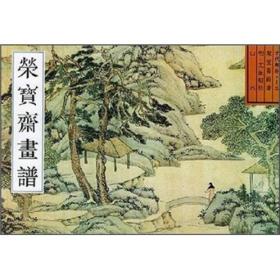

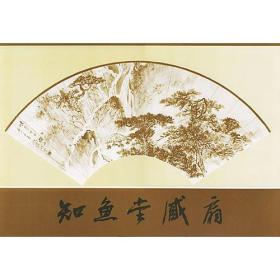
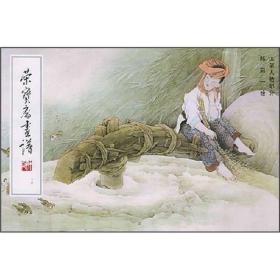

以下为对购买帮助不大的评价